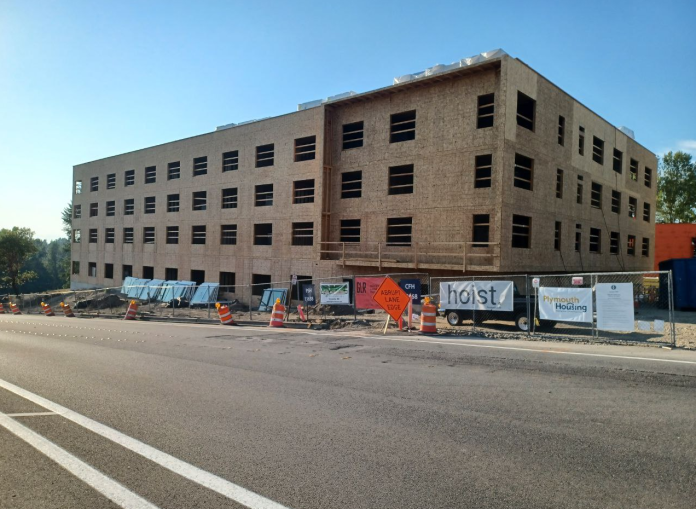
Months of work by Bellevue’s city staff, Planning Commission, and City Council finally concluded Monday evening when Council voted to permanently allow permanent supportive housing (PSH), emergency housing, and transient housing units throughout more parts of the city. The topic was kick-started by the state legislature’s passage of HB 1220 during the 2021 legislative session, which sought to reduce historical inequities in housing availability and distribution by requiring cities to allow permanent supportive housing in all areas where residences, hotels, and motels were allowed, and to allow emergency housing in all districts where hotels and motels were allowed.
According to the statute, while emergency housing represents temporary housing for people experiencing or at risk of experiencing homelessness, permanent supportive housing residents sign leases, can stay indefinitely, and are given access to health services that can address their unique behavioral or physical health conditions.
The final ordinance passed on a 4-3 vote, with Mayor Lynne Robinson siding with progressives to advance the final proposal. “I’m very eager to move forward on providing housing… I’m anxious to create the entire spectrum of affordability in our housing,” said Robinson before the vote.
Opposition from conservative councilmembers can likely be pinned on the failure of nine separate amendments from Councilmember Jennifer Robertson, whose edits would have added further regulations to supportive housing facilities. Robertson’s amendments would have, among other things, set maximum occupancy limits for supportive housing facilities in single-family zones, required a half-mile buffer between some supportive housing sites, and required a “community relations plan” to guide a facility’s relationship with the surrounding neighborhood.
During her comments Monday evening, Robertson argued that her amendments were meant to help ensure that housing residents were provided with adequate services, avoid the clustering of housing in certain neighborhoods, and provide nearby residents with increased transparency. Across multiple City Council and Planning Commission meetings however, supportive housing providers cautioned that additional siting and procedural restrictions could lead to delays and costs that would prevent the siting of a sufficient number of supportive housing units in Bellevue. This matters because HB 1220 did allow for cities to impose restrictions on spacing, occupancy, and intensities of use of PSH units, provided that the restrictions “did not prevent the siting of a sufficient number” of units in a jurisdiction.
Uncertainty remains over the precise need for such facilities in Bellevue. The city’s latest Housing Needs Assessment from 2016 showed that there was a deficit of nearly 4,000 units for people making 30% or less of area median income (AMI), who are the households most at risk of homelessness. More up-to-date numbers are to come later this year as part of the city’s Comprehensive Plan update, but with rapid employment growth outpacing housing production, the deficit is widely believed to have increased.
Although not all low-income residents are in need of supportive housing, Bellevue missed out on an opportunity to contribute to a regional PSH approach when it decided to levy a 0.1% sales tax itself instead of joining a wider King County effort. Where Bellevue’s program has thus far partially funded 25 affordable units, King County’s Health through Housing program has purchased 10 hotels (including two on the Eastside) to set aside nearly 1,000 units for permanent supportive housing.
In fact, one of Robertson’s proposed amendments would have made it difficult for Bellevue to take a similar approach to addressing homelessness within its borders. Amendment A2 would have set a maximum number of 30 dwelling units per acre for PSH sites in many mixed-use districts. Because many hotels, when their rooms are converted to individual units, would feature more than 30 housing units per acre of land, her amendment would have made the use of former hotels as permanent supportive housing infeasible in many parts of the city.
Although minimal time was allowed for discussion of each amendment, Robertson took her time explaining her justification for each of her edits before they were each rejected on a 4-3 vote. On her proposal to introduce minimum separation requirements, she raised the concern that a “sober living” supportive housing facility could be sited immediately adjacent to a “low barrier facility where you could drink and do drugs in your room,” or that a provider could purchase four homes on a single street. On her amendment to limit sites in mixed-use districts to 100 residents (separate from the dwelling units amendment), she warned that without restrictions, “we could have [a facility] that has 1,000 residents…”
Councilmember John Stokes, who voted against all of Robertson’s amendments, later indirectly referred to some of her claims as “overblown” and “off-target.”
Later in the meeting, Stokes continued, “I think a lot of things that have been said in favor of [Robertson’s amendments], they’re more designed to make this difficult for housing, more designed to put restrictions, more designed to make this take longer to get done, and it’s a pattern that’s gone on for a long time in this whole area of affordable housing, shelters, and everything else.”
Stokes was likely referencing the lengthy fight around the Eastside’s permanent men’s shelter, operated by Congregations for the Homeless. A key vote in 2018 passed on the same 4-3 margin, with Councilmembers Lee, Nieuwenhuis, and Robertson rejecting regulations around permitting and community engagement.
After praising the Eastgate shelter as a “model” and saying that Bellevue was doing a “great job in providing… affordable housing [and] housing of all types,” Councilmember Conrad Lee described Monday’s vote as “undoing the good work that we have accomplished.” Deputy Mayor Jared Nieuwenhuis, referencing his recent re-election last fall, said, “For me personally, who ran to have the pleasure to sit in this seat and represent the people of Bellevue about protecting our neighborhoods, today is a very sad day… Today we took a step towards going towards other cities that have absolutely no standards.”
With Nieuwenhuis frequently drawing distinctions between Seattle and Bellevue, it’s likely he had the former in mind when making these remarks, but the city need only look to its neighbor Kirkland to view a jurisdiction with no additional regulations to state-mandated housing legislation.
With all amendments failing to pass, the final motion which advanced for a vote was the original April recommendation from Bellevue’s Planning Commission. With its passage, supportive housing in Bellevue will face minimal regulations beyond what’s outlined in state law, but the same cannot be said of emergency housing. Because Bellevue draws a distinction between “transient” and “non-transient” emergency housing (a distinction based on length of stay and one not present in HB 1220), some emergency housing providers will still need to go through a lengthy Conditional Use Permit (CUP) process before facilities can be built.
Councilmember Jeremy Barksdale, with a slate of his own amendments, attempted to remove the length-of-stay distinction and eliminate the CUP requirement, but Mayor Robinson sided with conservatives to oppose both of Barksdale’s amendments.
With permanent regulations now in place, one would think the saga around permanent supportive housing in the city would be over. However, at Mayor Robinson’s request, staff are poised to return in a year with data on how the ordinance has affected the production of PSH and emergency housing units in the city. For better or for worse, supportive housing is therefore likely to be a hot topic in Bellevue for the foreseeable future.
Chris Randels is the founder and director of Complete Streets Bellevue, an advocacy organization looking to make it easier for people to get around Bellevue without a car. Chris lived in the Lake Hills neighborhood for nearly a decade and cares about reducing emissions and improving safety in the Eastside's largest city.

